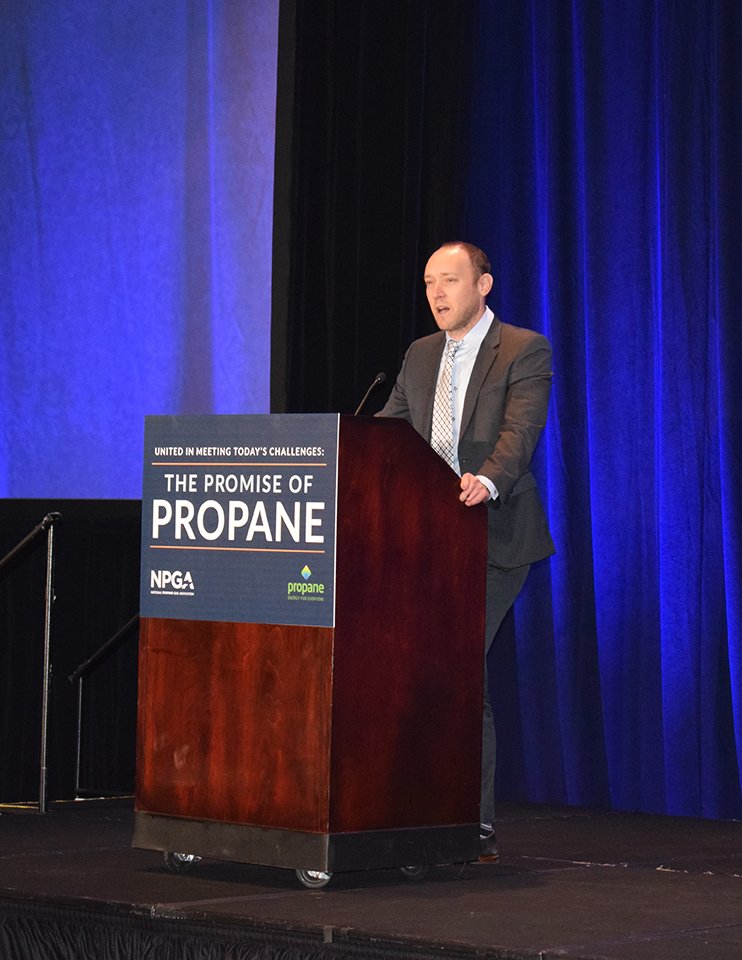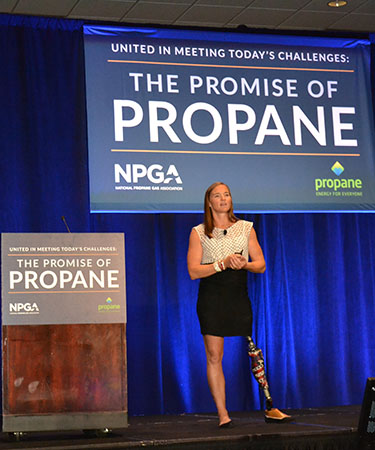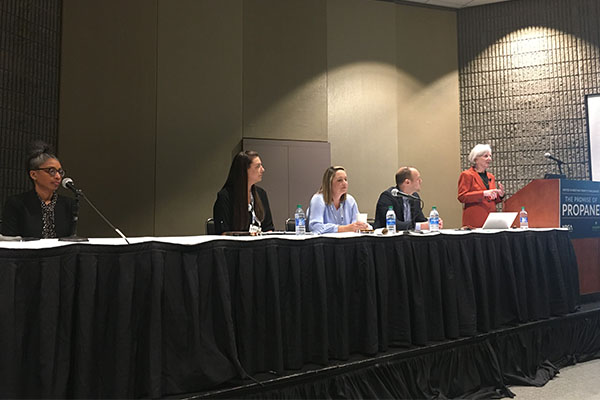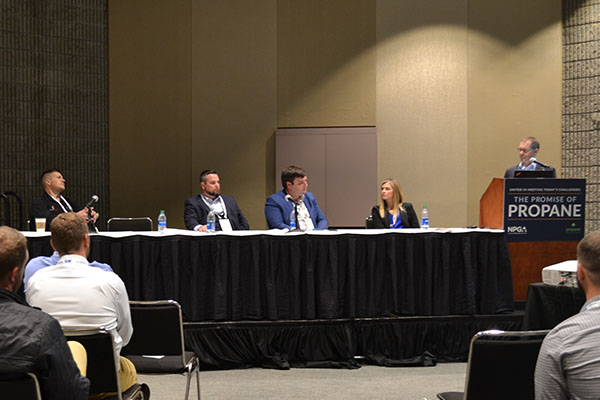NPGA Propane Expo returns in person to Atlanta
The National Propane Gas Association’s (NPGA) Southeastern Convention & International Propane Expo launched successfully in Atlanta 2.5 years after its last show.

Steve Kaminski attends his first Southeastern Convention & International Propane Expo as president and CEO of the National Propane Gas Association. Photo by LP Gas staff
The Propane Expo was set to take place in April 2020, but COVID-19 sidelined the industry’s largest trade show until this fall, an unfamiliar time frame for the convention but one chosen by NPGA based on available convention center dates and host hotel availability in Atlanta. The show was held Oct. 18-20 at the Georgia World Congress Center.
While attendance was down considerably (official attendance numbers have not been released), many attendees and exhibitors expressed positivity about the event’s return – most notably because it helped to reconnect industry members.
“To say I’m humbled and proud would be an understatement,” says Steve Kaminski, who experienced his first NPGA Propane Expo after becoming president and CEO in October 2019.
The Propane Expo shifts to Nashville, Tennessee, in 2022 and 2023, and then to Charlotte, North Carolina, in 2024 and 2025. The shows will be held in April.
NPGA began its fall committee and board meeting schedule immediately following the Propane Expo.
PERC update
Tucker Perkins provided an update about Propane Education & Research Council activities. He spoke about what’s new (the propane brand and tagline “Energy for Everyone”), what’s different (propane when compared to other energy sources because “we have a face with our product”), and how the industry must begin to tell its story properly because propane can accelerate decarbonization and ensure equity on the path to zero emissions. “The fuel is the right fuel,” Perkins says.
Keynote speaker
Melissa Stockwell, a U.S. Army veteran and Paralympic athlete, opened the Propane Expo with a motivational presentation about how she pursued athletic greatness even after she lost a leg in a roadside bomb incident in Iraq.

Melissa Stockwell addresses propane professionals with a motivational message. Photo by LP Gas staff
After she learned to walk with a prosthetic leg, Stockwell trained for numerous sporting events. She competed as a swimmer in the 2008 Paralympic Games in Beijing, and as a triathlete in the 2016 Games in Rio and the 2021 Games in Tokyo. She is a three-time world champion Paratriathlete and has completed an Ironman. She says she competes to represent others who endure more severe conditions and injuries than she did, including fellow Army veterans: “I was running because I could for people who no longer could.”
She encourages the audience of propane professionals to find supportive teammates in work and in life, give themselves enough credit to persevere through challenges and practice gratitude even when things don’t go as expected.
Staffing solution
At a time when companies across industries are struggling with staffing challenges, Maj. Gen. Thomas M. Carden Jr., adjutant general of the Georgia Department of Defense, urged Propane Expo attendees to consider hiring military veterans for their businesses. Military members possess qualities that make them ideal candidates for an industry’s workforce; they’re physically fit, disciplined, drug free and emotionally mature, Carden explains. “If you give these men and women an opportunity to work in your sector, I assure you that you won’t be sorry,” he says.
Diversity and inclusion
A panel led by Nancy Coop of Cetane Associates, and composed of Kaminski of NPGA, Michelle Bimson Maggi of AmeriGas, Jennifer Jackson of AmeriGas and Joy Alafia of the Western Propane Gas Association, agree that a conversation about diversity and inclusion in the propane industry is overdue.
The session began with definitions of “diversity” and “inclusion” so industry members are on the same page about what those terms mean. Jackson explains that there are a lot of myths surrounding this topic. Diversity and inclusion is not, for example, just about checking the boxes in terms of race or gender. It also can refer to neurodiversity, for example: She asks the audience whether they employ anyone with autism and to consider what an inclusive workplace looks like for these individuals.

From left are Joy Alafia, Western Propane Gas Association; Jennifer Jackson, AmeriGas; Michelle Bimson Maggi, AmeriGas; Steve Kaminski, NPGA; and Nancy Coop, Cetane Associates. Photo by LP Gas staff
Checking the boxes is the easy part, adds Bimson Maggi. Diversity is really about diversity of experience and thought, which ultimately protects and grows an organization. She recounts a time when her team took personality assessments and found that almost all of them fell into the same category. The consultant who ran the assessments explained how dangerous that can be on a management team: “Like hires like,” says Bimson Maggi. “I need to hire my blind spots now.”
For Kaminski, leading diverse and inclusive teams requires a shift in mindset. Kaminski encourages open dialogue to avoid problematic assumptions and gossip among team members: “Part of inclusion is giving everyone an open forum so issues can be hashed out,” he says. Diversity isn’t always something you can see, he emphasizes, so avoid assumptions about people’s experiences and be mindful about how you approach a conversation.
Alafia emphasizes the importance of staying up to date on societal change. During a conference she attended, she noted that one speaker encouraged listeners to “be like Columbus” and explore new frontiers. That speaker and perhaps some people in the audience may not have understood why that statement would be offensive to some groups, but a diverse team would catch the problem. If you don’t understand, says Alafia, someone in your organization should have you covered.
Alafia also compares giving offense to getting a speeding ticket: “Just because you don’t know it’s offensive, doesn’t give you a pass.”
“Perception is reality,” echoes Jackson, who shares her own experiences with sexism. “It doesn’t matter what you believe if your entire team is telling you differently.”
From a business standpoint, diversity brings more ideas to each decision, says Coop, so you stand to have better ideas and beat competitors.
Women in Propane roundtable
Christina Armentano, executive vice president of Paraco, led an interactive session about leadership lessons she has learned throughout her career at her family’s propane operation, a $1 billion e-commerce company and a global management consulting firm.
She recounts how, during her education and early career, she learned about the importance of networking and began to develop her leadership style. When she joined the family propane business in 2014, she says her leadership style continued to evolve to include more emotional intelligence, better productivity measures and employee empowerment. For example, she found that her strong focus on completing tasks during the workday sometimes prevented her from taking time to talk to employees about their lives and build better relationships. In this way, her strength – productivity – became her weakness, she explains.
During the session, audience members share their own leadership struggles, including difficulties with time management, building strong relationships and implementing change. Each audience member also shares a takeaway from Armentano’s presentation. Many say they are moved by her “strength as weakness” anecdote and also plan to move some tasks from their plates to team members’ to empower those employees to take on more responsibility and grow.
Looking toward the future
LP Gas magazine hosted an educational session at the Propane Expo. Editor-in-Chief Brian Richesson moderated the session titled “Preparing for the Future: The Propane Industry’s Next Generation of Leaders.” The panel was composed of LP Gas Rising Leaders Raleigh Garrett of G&S Gas Service, Kara Tucker of Koppy’s Propane, John Barnett of Suburban Propane and Frank Edwards of Coles Energy. Panelists covered topics such as leadership, workforce development and recruitment, technology, and opportunities and challenges in the industry.

From left are Frank Edwards, Coles Energy; John Barnett, Suburban Propane; Raleigh Garrett, G&S Gas Service; Kara Tucker, Koppy’s Propane; and Brian Richesson, LP Gas. Photo by LP Gas staff
Like many propane marketers across the country, panelists report raising wages to retain drivers and service technicians over the past year.
But they have also worked to create a more supportive work environment to attract and retain the next generation.
“Our generation especially is focused on having flexible jobs and respecting people’s time off,” says Garrett. “When you’re off, you’re off. Or when you’re on call, you’re on call.”
Edwards says flexible hours have enabled employees at Coles Energy to achieve higher quality work.
“A happy home life leads to a happy teammate,” he says.
As a leader in Suburban Propane’s autogas division, Barnett aligns propane’s positive attributes with younger generations’ values to get them excited about joining the industry. For example, young people respond well to the fact that propane is a clean-burning energy source, he says.
Panelists also recount their attempts as young leaders to implement change in an environment that may not be welcome to those changes.
Tucker, who has advanced technological capabilities at her family’s business, advises other young leaders to find a few “change leaders” in their organizations who will be cheerleaders for their initiatives. She recommends they do their homework to prepare for difficult conversations and clearly communicate the benefits of their proposals.
For example, when Koppy’s Propane began implementing tablets in trucks, leadership selected the driver least likely to accept the technology as the first to test it. When that employee gave his approval, other employees were more willing to adapt to the change, Tucker explains.
Barnett encourages young leaders not to dwell on failures but to learn from them as they work to implement change. He says he strives to create an environment where employees have the freedom to do their jobs and to fail.
“Give them the responsibility to fail, and pick them back up. Encourage them to do more of what they’re doing well,” he says.
Nominate a Rising Leader for 2022.
For more coverage of the Propane Expo, see the November issue of LP Gas.
Featured photo: LP Gas staff















